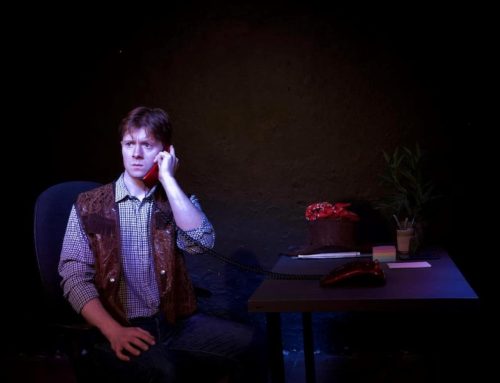Nikoletta Soumelidis’ two-hander Spent runs the same story of a failing relationship over two evenings but alternates the gender of the actors playing each role. Do our perceptions, interpretations and evaluations of what happens to each character in the piece look different for a man or a woman? It is a neat idea, and Spent has something to say about power dynamics in relationships. Alas, despite two likeable performances from Soumelidis and Charlie Collinson, a melodramatic ending and an unexplored Fifty Shades of Grey subplot leave the piece feeling strangely unconvincing
Character A comes from a privileged family with a holiday home in the Cote D’Azur but remains in thrall to a bullying and abusive father. Success at a challenging ad agency job demands long days at the office and evenings schmoozing with clients, something bound to annoy the most patient of partners. Character A also has a thing for being submissive in bed. “Biting can be pleasant, scratching too,” we hear.
Character B had childhood leukaemia; indeed his/her first memory is of a child dying in the adjacent hospital bed. Brought up by grandparents and semi-estranged from an unloving and vindictive Mum, there are hints of substance abuse and suicidal thinking in her/her backstory. He/she is a failed artist with a minimum-wage job, but on the plus side owns an impressive collection of bondage gear and is an experienced “Dom”.
Spent tracks the duo’s relationship over a time-shifting two years. An early rom-com style meet-cute over a kitchen mishap tracks into a loved-up honeymoon period, then mid-term frictions, and a final all-too-predictable breakup. Director Helen Cunningham gives us writhing choreographed dance sequences at the outset and interspersed throughout to convey the heady undercurrents of love, sex, tension, and discord as the relationship waxes and wanes.
The couple initially bond over a friendly disagreement on how to interpret Shakespeare’s Romeo and Juliet, which one supposes is some deliberate foreshadowing on the writer’s part. “You can’t have true love without a little bloodshed” says A early on as if to emphasise the point. B dismisses romance as “narcissism, insecurity, and possessiveness” which hints at what he/she is bringing to the table. Anticipate jealousy, infidelity, slowly eroding trust, and furtive expeditions into one another’s text messages. Should A take that six-month posting in Tokyo and what will happen to B if she/he decides yes?
The BDSM aspect of the couple’s relationship is never really investigated and seems to fizzle out after the initial frisson of sexual excitement. Whatever power dynamics we see emerge come from outside the bedroom not inside, which leaves one wondering why Soumelidis felt it necessary to bring rope and whips into the equation in the first place. The more interesting topic – what happens in relationships when one partner is more successful than the other, particularly when the higher earner in a heterosexual pairing is the woman – feels underexamined.
Glimpses into the relationship can be as short as a couple of lines of dialogue, which adds momentum but leaves one wishing things would slow down a bit. Characters deliver periodic monologues directly to the audience to reveal angsty reflections on their partners, which begs the question of why they are telling us and not each other. Soumelidis’ writing is crisp and economical, though too often seems to emerge unedited from the rom-com playbook. “I love you, you don’t have to say it back,” says one to another. “I can’t do this anymore… there’s nothing left for me to give,” we hear later on. “We killed ourselves and called it love,” is how one character portentously sums up where events have brought them.
Do we see things in different ways on different evenings depending on the characters’ genders? Yes, things are predictably darker and more threatening (though never to the level of abuse) in the second iteration of the piece when the male is the most obviously toxic of the pair. But scientists would complain here of the effect of confounding variables. We know where things are headed at the outset of the second evening (and we have already heard all the jokes) so inevitably there are fewer laughs and a darker subtext. Soumelidis and Collinson play the characters in different ways on different evenings too. A scene played with vulnerable histrionics by one comes across a malign threat when delivered by another. But is this the effect of the actors, or the characters they portray? Abuse is about power and control, not gender, is the only conclusion one can draw here. The melodramatic ending is telegraphed early on and may leave you wishing these two had just left things as a one-night stand.
Writer: Nikoletta Soumelidis
Director: Helen Cunningham
More Recent Reviews
Playfight. Soho Theatre.
Writer Julia Grogan’s breathtakingly assured debut play arrives at Soho Theatre following stellar reviews at the Edinburgh Fringe and [...]
All The Happy Things. Soho Theatre.
Naomi Denny’s three-hander comedy-drama All The Happy Things covers familiar themes within a recognisable premise. A grieving protagonist comes [...]
Telly. Bread and Roses Theatre.
The challenge with absurdist comedy is that many people do not find it funny. Laughing at the sheer weirdness [...]






